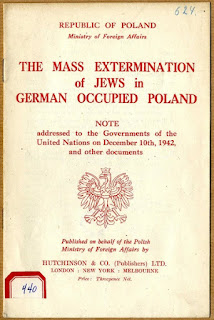Eighty years ago the British and Americans finally condemn German extermination of Jews
The British government finally departed from its non-commital attitude towards the Nazi attempt to exterminate the Jews throughout occupied Europe. In response to a report from the Polish government-in-exile the Foreign Secretary delivered a declaration on behalf of the United Nations, chiefly Britain and the US, condemning the Nazi programme and promising punishment of those responsible. At the suggestion of Labour MP William Cluse the House stood up in silence, a gesture usually reserved to mark the death of a sovereign.
British forces crossed back into Burma in what was presented as a return to the offensive after being routed by the Japanese erlier in the year. The objective was relatively unambitious: to establish a foothold on the Arakan peninsula including seizing the island of Akyab. The attack faced weak opposition but the omens were not good. The British commander Noel Irwin was on poor terms with the commander of neighbouring forces, Bill Slim, and determined to conduct the operation on his own. The demands of the North African campaign meant that an amphibious assault on on Akyab was canceled. The commitment of Orde Wingate's deep penetration units was reversed.
Rommel was under severe pressure from a number of quarters, notably Hitler himself, to mount a stand against the British Eighth Army's advance after el Alamein. Rommel would have preferred to continue his retreat into Tunisia; he knew that he no longer had the resources especially in air power to mount a serious counter-offensive. He did fight a more-or-less token delaying action at el Agheila in Libya but withdrew with minor losses.
A meeting at the Wolfsschanze in East Prussia achieved nothing and merely served to underline how Hitler was blindly driving his associates to destruction and they were powerless to resist. Mussolini was too ill to attend (albeit not too ill to conduct an affair with a 19 year old philosophy student) and sent his son-in-law foreign minister Count Ciano instead. Hitler ignored Ciano's suggestion of seeking peace with the Soviets; the Germans amused themselves by blaming Italian troops for the worsening situation on the Stalingrad front. Vichy prime minister Pierre Laval did even worse and was barely allowed to speak by Hitler.



Comments
Post a Comment